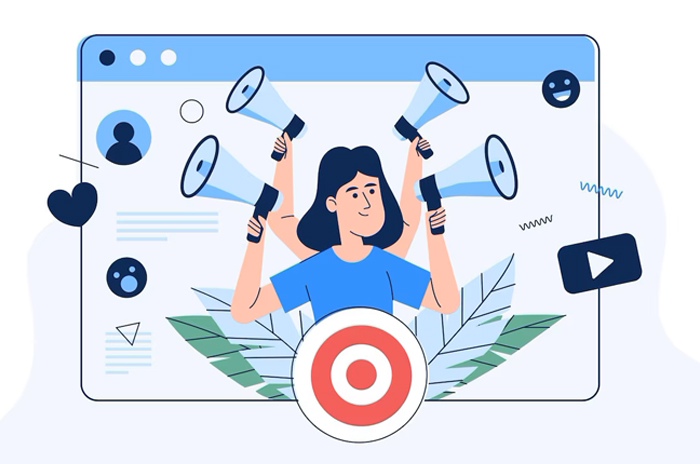In today’s world, having an online business can be extremely lucrative, but it requires proper marketing strategies to stand out from the competition. Marketing is the key to success for any online business, and it can help to increase the visibility and sales of your business. In this blog, we will discuss some effective ways to market your online business.
Know Your Target Audience
The first and most important step in marketing your online business is knowing your target audience. Understanding your audience’s needs and preferences can help you create products that cater to their needs and develop targeted marketing strategies.

Build a Website
Your website is the face of your online business, and it’s crucial to make it user-friendly and visually appealing. You can use website builders like Wix, Squarespace, or WordPress to build a website that is professional, engaging, and optimized for search engines.

The Benefits of Websites for Businesses: Why Every Business Needs a Digital Presence
In today’s digital age, having a website is essential for businesses of all sizes and industries. A website provides a digital presence that can help to increase visibility, engage customers, and drive sales. In this blog post, we’ll explore some of the benefits of websites for businesses.
- Increased Visibility: With a website, businesses can reach a wider audience by providing an online platform for customers to access information about their products or services. This can help to increase visibility and attract more customers.
- 24/7 Accessibility: A website allows customers to access information about a business and its products or services at any time of day or night. This can help to increase sales and revenue by providing customers with an easy and convenient way to learn about a business and make purchases.
- Cost-Effective Marketing: Websites can be an effective and cost-efficient way to market a business. They can be optimized for search engines, integrated with social media, and used to build an email list to promote products and services to potential customers.
- Customer Engagement: A website can be used to engage customers in a variety of ways, such as by providing helpful information, answering frequently asked questions, and offering customer support. This can help to build trust and loyalty with customers, leading to repeat business and positive reviews.
- Credibility: Having a professional-looking website can help to establish credibility and trust with potential customers. It can also provide a platform for displaying customer testimonials, case studies, and other social proof that can help to attract more customers.
- Competitive Advantage: A well-designed website can help businesses to differentiate themselves from their competitors and attract more customers. By providing a user-friendly and informative online platform, businesses can build a competitive advantage that can lead to increased success and growth.
With a website, businesses can increase visibility, engage customers, drive sales, establish credibility, and build a competitive advantage. Whether you’re a small business owner or a large corporation, having a website is essential for success in today’s digital age. So, if you haven’t already, it’s time to start building your digital presence and reaping the benefits of a professional and effective website.
Social Media Marketing
Social media is an excellent tool for marketing your business because it allows you to reach a large audience and engage with your followers on a personal level.
Social media platforms such as Facebook, Instagram, Twitter, and LinkedIn are excellent tools to market your online business. Creating social media profiles and engaging with your audience can help to increase your brand awareness, drive traffic to your website, and generate leads.

Here are some tips for marketing your business in social media:
- Choose the Right Platforms: Not all social media platforms are the same, and it’s important to choose the ones that align with your business and target audience. For example, Instagram is ideal for businesses with visually appealing products, while LinkedIn is more suitable for B2B businesses.
- Develop a Content Strategy: Developing a content strategy is crucial for marketing your business in social media. Your content should be informative, engaging, and align with your brand’s values and voice. You can use a mix of images, videos, and text to keep your audience engaged.
- Engage with Your Followers: Engaging with your followers is a vital part of social media marketing. Responding to comments, messages, and reviews can help you build relationships with your customers and increase their loyalty to your brand.
- Use Hashtags: Hashtags are an effective way to increase the visibility of your posts and attract new followers. Use relevant hashtags in your posts to increase their reach and engagement.
- Leverage Influencers: Collaborating with influencers can help you reach a new audience and increase your brand’s visibility. Look for influencers who align with your brand’s values and target audience and develop a strategy that benefits both parties.
- Run Contests and Giveaways: Running contests and giveaways can help you increase your social media following and engagement. Offer prizes that are relevant to your business and ask your followers to engage with your content to participate.
- Use Paid Advertising: Paid advertising on social media can help you reach a targeted audience and increase your brand’s visibility. Platforms like Facebook and Instagram allow you to target specific demographics and track the performance of your ads.
Email Marketing
Email marketing is the process of sending commercial messages to a group of people using email. It is a powerful marketing tool that allows businesses to communicate with their customers and build relationships.
Email marketing is an effective way to keep in touch with your existing and potential customers. By sending personalized and informative emails, you can increase customer loyalty, generate leads, and increase sales.

Here are some benefits of email marketing:
- Reach your audience directly: Email marketing allows you to reach your target audience directly, without any intermediaries. You can personalize your message to suit the specific interests of your audience.
- Increase brand awareness: Sending regular emails to your customers helps to keep your brand top-of-mind. You can use email marketing to promote your brand, products or services, and share news and updates.
- Drive sales: Email marketing is a great way to promote your products or services and drive sales. You can send promotional emails, discounts, or special offers to your customers to encourage them to make a purchase.
- Build customer loyalty: Email marketing allows you to stay in touch with your customers and build a relationship with them. You can use email to thank them for their business, offer exclusive discounts, and ask for feedback or reviews.
- Track results: With email marketing, you can track the results of your campaigns and analyze the performance of your emails. You can see open rates, click-through rates, and other metrics that help you improve your marketing strategy.
To get started with email marketing, you’ll need an email marketing service provider, such as Mailchimp, Constant Contact, or Campaign Monitor. These services offer a range of features, including email templates, list management, and reporting. You can use these tools to create and send professional-looking emails, track the results of your campaigns, and manage your email list.
Content Marketing:
Creating informative and engaging content is an excellent way to attract potential customers to your website. By producing blog posts, infographics, videos, and other types of content, you can establish yourself as an expert in your field and increase your credibility.
To get started with content marketing, you’ll need to develop a content strategy that outlines your goals, target audience, content topics, and publishing schedule. You’ll also need to create high-quality content that is relevant and valuable to your target audience. You can then promote your content through various channels, such as social media, email marketing, and paid advertising, to reach your target audience and achieve your marketing goals.

Here are some of the different types of content marketing
- Blogging: Blogging is one of the most popular forms of content marketing. It involves creating and publishing blog posts on a regular basis to provide helpful and valuable information to your target audience.
- Video: Video content has become increasingly popular in recent years, and it can be an effective way to engage your audience and communicate your message. This can include explainer videos, product demos, or even live streaming.
- Infographics: Infographics are visual representations of information, data, or statistics. They can be used to communicate complex information in a simple and engaging way.
- Case studies: Case studies showcase how your product or service has helped solve a problem or achieved a specific goal for a client. They can help build credibility and trust with your audience.
- Whitepapers and eBooks: Whitepapers and eBooks are longer-form content pieces that provide in-depth information on a particular topic. They can be used to position your business as a thought leader in your industry and generate leads.
- Podcasts: Podcasts are audio content pieces that can be used to share your knowledge and expertise on a particular topic. They can be a great way to reach a new audience and build a relationship with your existing audience.
- Social media: Social media platforms are a great way to share a variety of different content types, including images, videos, and blog posts. Social media can be an effective way to reach a new audience and engage with your existing followers.
- Webinars: Webinars are live or recorded video presentations that provide educational content on a specific topic. They can be used to build credibility and generate leads.
- User-generated content: User-generated content is created by your customers and can include reviews, testimonials, or social media posts. This type of content can help build social proof and increase trust with your audience.
Paid Advertising
Paid advertising is a powerful tool to drive traffic to your website and generate leads. Platforms such as Google Ads, Facebook Ads, and LinkedIn Ads allow you to target specific audiences and track the performance of your ads.

Here are a few additional strategies for promoting your online business:
- Collaborate with Influencers: Influencers are individuals who have a large following on social media and can help to promote your brand. By collaborating with influencers who align with your brand and target audience, you can increase your brand’s visibility and reach a new audience.
- Attend Trade Shows and Conferences: Attending trade shows and conferences can provide an opportunity to network with other professionals in your field and promote your brand. It can also help you stay up to date with industry trends and gain valuable insights into your target audience’s needs.
- Offer Free Trials and Discounts: Offering free trials and discounts is an excellent way to attract new customers to your online business. By providing value to potential customers and building trust, you can increase the likelihood of them becoming long-term customers.
- Use Video Marketing: Video marketing is becoming increasingly popular, and it’s an effective way to engage with your target audience. By creating video content that is informative, entertaining, and engaging, you can increase your brand’s visibility and generate leads.
- Monitor Your Metrics: It’s essential to track your marketing efforts and measure their effectiveness. By monitoring metrics such as website traffic, conversion rates, social media engagement, and email open rates, you can make data-driven decisions and adjust your strategies accordingly.
In conclusion,
Marketing your online business requires persistence, dedication, and a willingness to adapt to changing trends and customer needs. By combining different marketing strategies and continually monitoring your metrics, you can establish your brand as a leader in your field and increase your revenue and customer base.
Marketing your online business requires a combination of strategies that cater to your target audience’s needs and preferences. By understanding your audience, creating a professional website, optimizing for search engines, using social media and email marketing, producing engaging content, and paid advertising, you can increase your brand awareness, drive traffic to your website, and generate leads.
With persistence and dedication, your online business can reach new heights of success.









